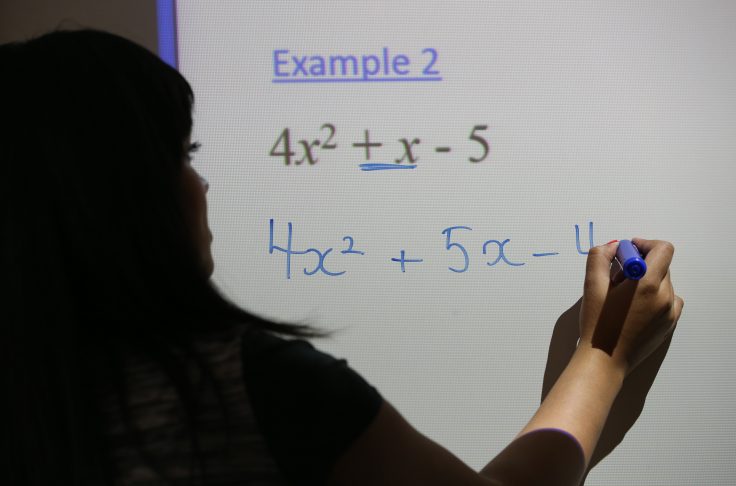The decade-long policy resulted in lower math scores and failed to fix the racial gap in advanced math classes

San Francisco public schools are walking back an equity policy that axed algebra for middle schoolers, a decade after the district put the policy in place.
The San Francisco school board voted on Tuesday to start offering eighth-grade algebra again, starting with pilot programs next year. Officials said in a board presentation that their students’ math scores declined since the algebra ban took effect a decade ago and that the racial gap in advanced math classes has not been fixed. Overall, eighth-grade math proficiency in the district has fallen from 51 percent to 40 percent, according to the board. Proficiency among black students fell from 11 percent to 4 percent.
San Francisco eliminated eighth-grade algebra for all students in 2014, enraging parents and students alike—particularly because students who don’t take the course in middle school cannot easily advance to calculus, a requirement of most elite universities for applicants to math and science programs. The district’s reversal comes as a growing number of districts around the country nix honors classes in the name of “equity.” Over the past few years, districts in Michigan, Silicon Valley, Los Angeles, Seattle, New Jersey, and elsewhere abolished honors courses in subjects such as English, math, and chemistry to promote more equitable outcomes.
It will take San Francisco schools three years to implement algebra into all the city’s middle and K-8 schools. Select schools will experiment with one of three approaches to the course: making it mandatory for all eighth graders, offering it only to those who are ready and interested, or setting it up as a “second” math class that anyone who wishes can take. Students on campuses who aren’t part of the pilot schools but who want to take algebra will have to enroll virtually or take it as a summer class before starting ninth grade.
In response to a request for comment, the San Francisco school board referred the Washington Free Beacon to its press release announcing the decision.
The board’s vote to restore the class represents a sea change from only a few years ago, when advocates touted the district’s ban as a model for all of California’s six million public school students. The architects for California’s K-12 math framework initially discouraged eighth-grade algebra, using San Francisco as their example. California has since backpedaled on its suggestion that San Francisco’s experiment should go statewide. By the time the state passed its final math framework last year, the authors had removed much of its language advising against advanced math classes for middle school.
Early champions of San Francisco’s algebra ban include Stanford professor Jo Boaler, a lead writer of California’s framework. The publication Education Week credited Boaler’s work as “heavily” informing the district’s policy. Early drafts of California’s math guidance cited data that Boaler had published in support of the ban, which were later debunked. Boaler also touted San Francisco’s policy in research and on social media.
When asked if she supports San Francisco’s reversal, Boaler in a statement to the Free Beacon said that she has always believed “students should be able to advance to content for which they are ready.”
“When ‘advancement’ results in unthoughtful decision-making about course options, many students are unfairly filtered out of high-level pathways at a young age,” she said, adding that the San Francisco school district seems to be “engaging thoughtfully to make sure that does not happen, and students can continue to have options to advance to higher-level content.”
Update 4:14 p.m.: This piece has been updated with a link to the school board’s press release.
Original News Source – Washington Free Beacon
Running For Office? Conservative Campaign Management – Election Day Strategies!
